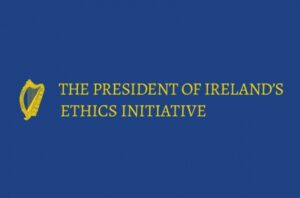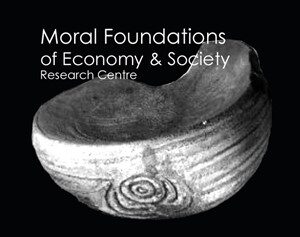OUR MISSION
The Economy & Society Research Centre is a collaboration between University College Cork and Waterford Institute of Technology.
The Centre is based in the Department of Sociology at UCC and the School of Humanities at WIT.
The Economy & Society Summer School is run as part of this centre.
The centre is run as part of the President of Ireland’s Ethics Initiative.

This initiative was started by Michael D. Higgins in 2013 to stimulate discussion around the place of ethics in understanding the challenges facing Irish society today.
An essential part of this is understanding the moral underpinnings of our economy and society.
Prof. Maggie O’Neill and Dr. Ray Griffin are the current directors of the centre.
Our logo is the Dagda’s Cauldron from Knowth, a dining vessel that never emptied and from which everyone got a fair share.
This vessel serves as a symbolic representation of the gift relation; the anthropologically universal moral foundation of economy & society.
The Economy & Society Research Centre:
- Studies the manner in which the development of the modern global economy, driven by unlimited technological growth and an unbridled profit motive, irreparably damages the very tissue of social life;
- Suggests ways to stop this process by re-ethicizing the social and moral fabric that is necessary in order to live a healthy, meaningful and ethical life;
- Organizes courses, both at the undergraduate and graduate level, that promote an education oriented towards a responsible, meaningful, healthy and hopeful life.
It is evident that Ireland, just as the rest of the world, is not simply undergoing a deep economic recession, but is experiencing a very fundamental social, political and cultural crisis, which incorporates a substantial environmental dimension as well.
Any claim that this crisis can be overcome by the standard means, and therefore soon we can return to business as usual, is not sound practical reason, but an irresponsible evasion of facing reality. At the same time, any radical or revolutionary solution, and for good reasons, due among others to the failure of the Soviet and related experiments, has lost credibility.
Even further, purely normative solutions, whether in the name of cosmopolitanism, or some a priori ethical principles, seem to be weak, in decline, or ineffective.
We have to reckon that we, altogether, have reached an impasse, or even paralysis. It is necessary to find a way out, but for this we must be able to overcome some deeply ingrained ways of thinking, while we should not renounce our betray basic ethics and fundamental values of our culture. In the words of John Maynard Keynes, who faced a similar situation, ‘the difficulty lies, not in the new ideas, but in escaping from the old ones, which ramify, for those brought up as most of us have been, into every corner of our minds’.
The Centre takes its mission from, amongst other sources, Max Weber’s writings from an historical period that has troubling similarities to our own; namely, Weber’s formulation of the problem of escaping the seemingly watertight, irresistible and irreversible ‘iron cage’ of the present age of rationalized acquisitiveness; the comprehensive intellectual, political and moral programme that Weber set out in Economy & Society; and the hopefulness of ‘Politics as a Vocation’ where he says: “It is perfectly true, and confirmed by all historical experience, that the possible cannot be achieved without continually reaching out towards that which is impossible in this world”.
Read More
